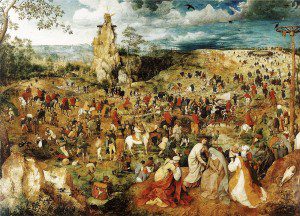
Amazing grace, how sweet the sound, etc.
I have the pleasure of taking part in an ecumenical discussion group for Christian graduate students from universities across the United States. Several of us are Catholics, there’s an Anglican or two, some other Protestants—all in all a good mix. In particular, yesterday, we discussed the Catholic Reformation (also called the Counter-Reformation), the period, often associated with the Council of Trent, during which the Church clarified Her theology, reformed Her institutions, attempted to destroy rampant corruption, and generally set out to defend the Catholic understanding of the Faith.
A matter of difference stood out: the ability of mortal sin to destroy sanctifying grace (i.e. that mortal sin can move us away from God so that our salvation is jeopardized). Catholic Answers sums it up well:
Calvin taught the absolute impossibility of losing justification. Luther said it could be lost only through the sin of unbelief; that is, by undoing the act of faith and rejecting Christ; but not by what Catholics call mortal sins.
Catholics see it differently. If you sin grievously, the supernatural life in your soul disappears, since it can’t co-exist with serious sin. You then cease to be justified. If you were to die while unjustified, you’d go to hell. But you can become re-justified by having the supernatural life renewed in your soul, and you can do that by responding to the actual graces God sends you.
I’m no expert on Protestant theology, and the ways in which this understanding actually differs (as opposed to merely differing in language) from nuanced Protestant thought is above my pay grade. At minimum though, it seems the Catholic emphasis is on the struggle of the faithful life. For Catholics, because salvation is never assured, because every moment is pregnant with temptation and love, to struggle is to live. Do I need to quote Lamentations 3 again?
Like a Woody Allen character, then, Catholics live with an enduring anxiety. On the one hand, there’s the constant back-and-forth of life: you could be holy for years, slip, fail to feel true contrition, and, so to speak, throw it all away. On the other, Catholicism means hope. One can ignore the struggle, internalize it, hide from God, and, thanks to the wonder of the Lord’s justice and mercy, repent at the last moment and still find salvation: simply ask the droll dandy Oscar Wilde or King Manfred from Dante’s Purgatorio.
For us, salvation is situated in struggle precisely because it seems both nigh impossible and yet always available, an option unto death, yet constantly evading us in our weakness.
What seems odd to me is that we don’t apply this logic, at least analogically, to spheres beyond the salvific.
Take this piece in Crux about the increasing number of Hispanic Catholic in the United States—to the point:
One the one hand, as long as there are millions of Catholic immigrants in our communities, we have the pastoral and moral obligation to serve them, usually in the languages they speak and honoring the culture in which they discern their relationship with Jesus Christ. These people are not going to assimilate overnight. They may never fully assimilate, as was the case with many immigrants in earlier generations. This is just a fact of life.













